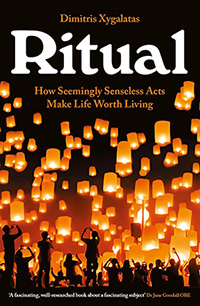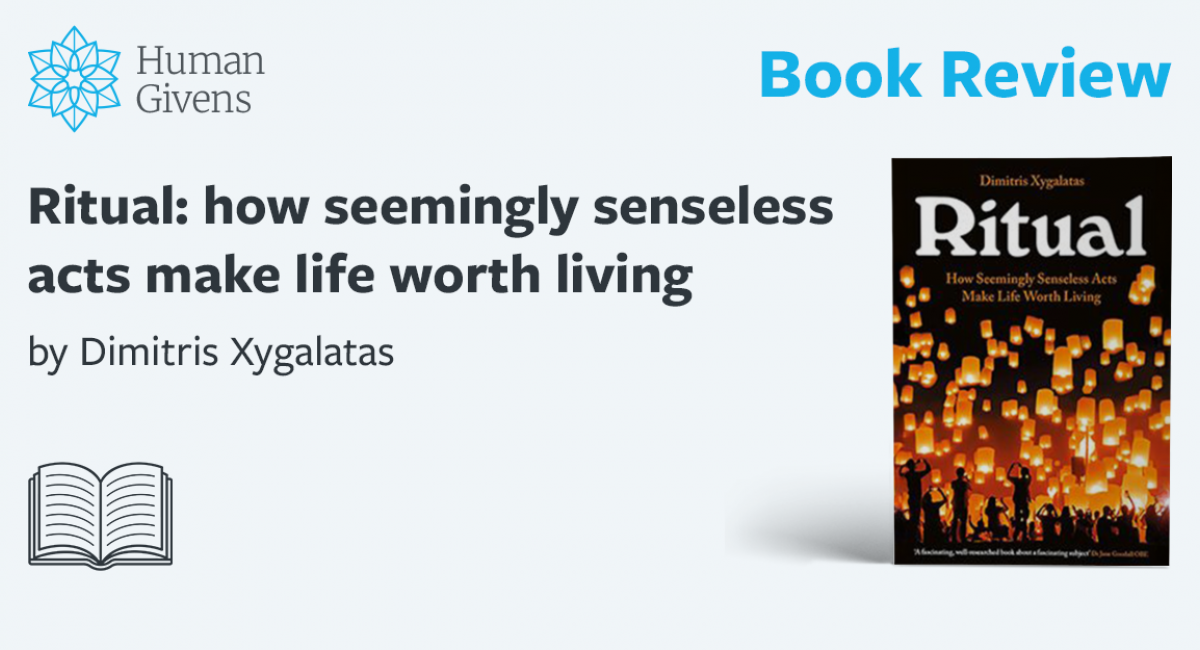Book review - Ritual: how seemingly senseless acts make life worth living
Denise Winn reviews 'Ritual: how seemingly senseless acts make life worth living' by Dimitris Xygalatas (Profile Books, 2024)
The relevance for human givens of this absorbing book is nicely encapsulated in one sentence in its introduction: “While habits help us organise important tasks by routinising them and making them mundane, rituals imbue our lives with meaning by making certain things special.” Ritual, as anthropologist and cognitive scientist Xygalatas shows, can also fulfil many other human needs, including control, status, security, connection and cementing relationships, and even competence (rituals must be performed exactly right – one very funny anecdote tells the far-reaching consequences when a baptism went wrong). In pathological form, rituals can explain obsessive-compulsive behaviours.
 Children, when very young, insist on rituals, often around meals or bedtimes, which they follow compulsively, believing these to affect what happens in their world, giving them a sense of security. This, in different forms, may commonly persist into adulthood. Xygalatas tells us how, early in the 20th century, Trobriander islanders were observed to carry out elaborate ceremonies before their fishermen ventured out into deep seas, but did nothing of the sort before fishing expeditions in lagoons. Fishing in the latter was safe and guaranteed a good haul, whereas fishing in deep waters was dangerous. Carrying out complex rituals, including sacrificing pigs, preparing special herbs, rubbing canoes with mint and wearing body paint imbued everyone with a sense that they had a degree of control over keeping the fishermen safe. Anthropologists noticed that Trobriander rituals proliferated in all areas of life that had an element of chance, such as when planting vegetables vulnerable to disease as opposed to hardier crop.
Children, when very young, insist on rituals, often around meals or bedtimes, which they follow compulsively, believing these to affect what happens in their world, giving them a sense of security. This, in different forms, may commonly persist into adulthood. Xygalatas tells us how, early in the 20th century, Trobriander islanders were observed to carry out elaborate ceremonies before their fishermen ventured out into deep seas, but did nothing of the sort before fishing expeditions in lagoons. Fishing in the latter was safe and guaranteed a good haul, whereas fishing in deep waters was dangerous. Carrying out complex rituals, including sacrificing pigs, preparing special herbs, rubbing canoes with mint and wearing body paint imbued everyone with a sense that they had a degree of control over keeping the fishermen safe. Anthropologists noticed that Trobriander rituals proliferated in all areas of life that had an element of chance, such as when planting vegetables vulnerable to disease as opposed to hardier crop.
Key in creating the power surrounding rituals is that the substance of them may have no relation to whatever event is about to occur. Thus they require full attention from onlookers seeking understanding, generating an ambience of ‘something special’ and meaningful. In one telling experiment, two identical drinks were poured, one after the other from the same jug, but, for one, the server performed elaborate unrelated acts, such as flicking a cloth theatrically towards the glass before cleaning it and bowing to the glass when finished. Study participants, who knew the drinks were identical, still considered the ‘ritual drink’ more special.
Xygalatas delves deep into a whole host of rituals, from the more banal, such as those around birthday parties and concert going and athletics, to rites of passage, firewalking, healing, burial and redemption, drawing together threads from all. The most excruciatingly demanding tend to involve religion. A Tamil festival known as the Thaipusam involves people often opting to have large thick metal rods pierced through one cheek and out the other, or to drag chariots up steep hills by chains attached to hooks inserted through the skin of their backs. Far from causing collapse and infection, Xygalatas’s research shows, those who participated suffered no physical ills and enjoyed enhanced psychological health. And those who attended the festivities and supported the courageous participants experienced a heightened sense of community and a greater tendency towards prosocial actions.
Because of the hypnotic and dissociative elements of many such rituals, it has even been suggested that ability to go into trance was selected for in our evolutionary past, shaping a biological basis for religion and spirituality. Indeed, Xygalatas’s compelling dissection of highly diverse ritual behaviours leads him to conclude that “ceremony is a primordial part of human nature, one that helps us connect, find meaning and discover who we are”.
Latest Tweets:
Tweets by humangivensLatest News:
HG practitioner participates in global congress
HG practitioner Felicity Jaffrey, who lives and works in Egypt, received the extraordinary honour of being invited to speak at Egypt’s hugely prestigious Global Congress on Population, Health and Human Development (PHDC24) in Cairo in October.
SCoPEd - latest update
The six SCoPEd partners have published their latest update on the important work currently underway with regards to the SCoPEd framework implementation, governance and impact assessment.
Date posted: 14/02/2024












